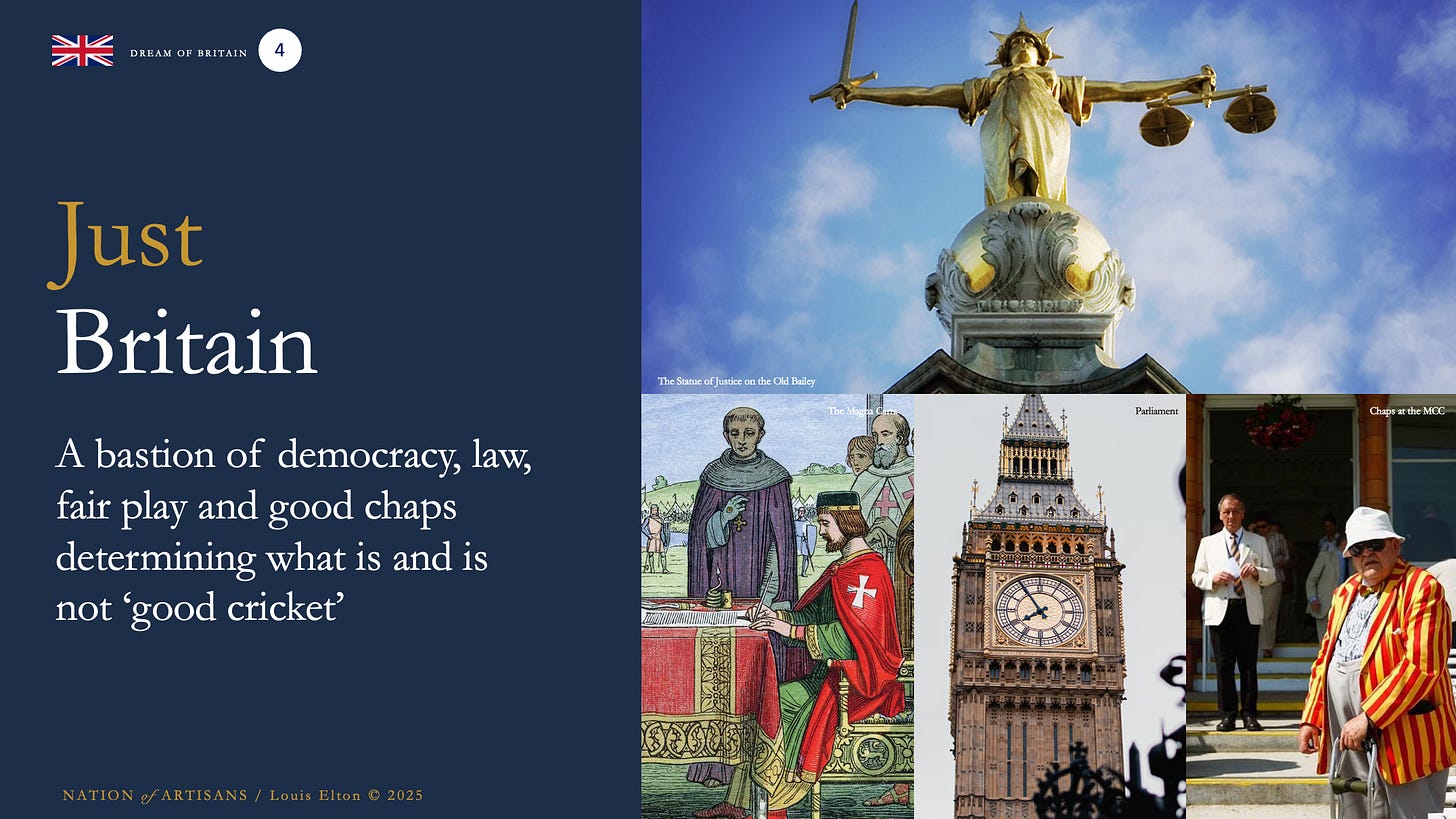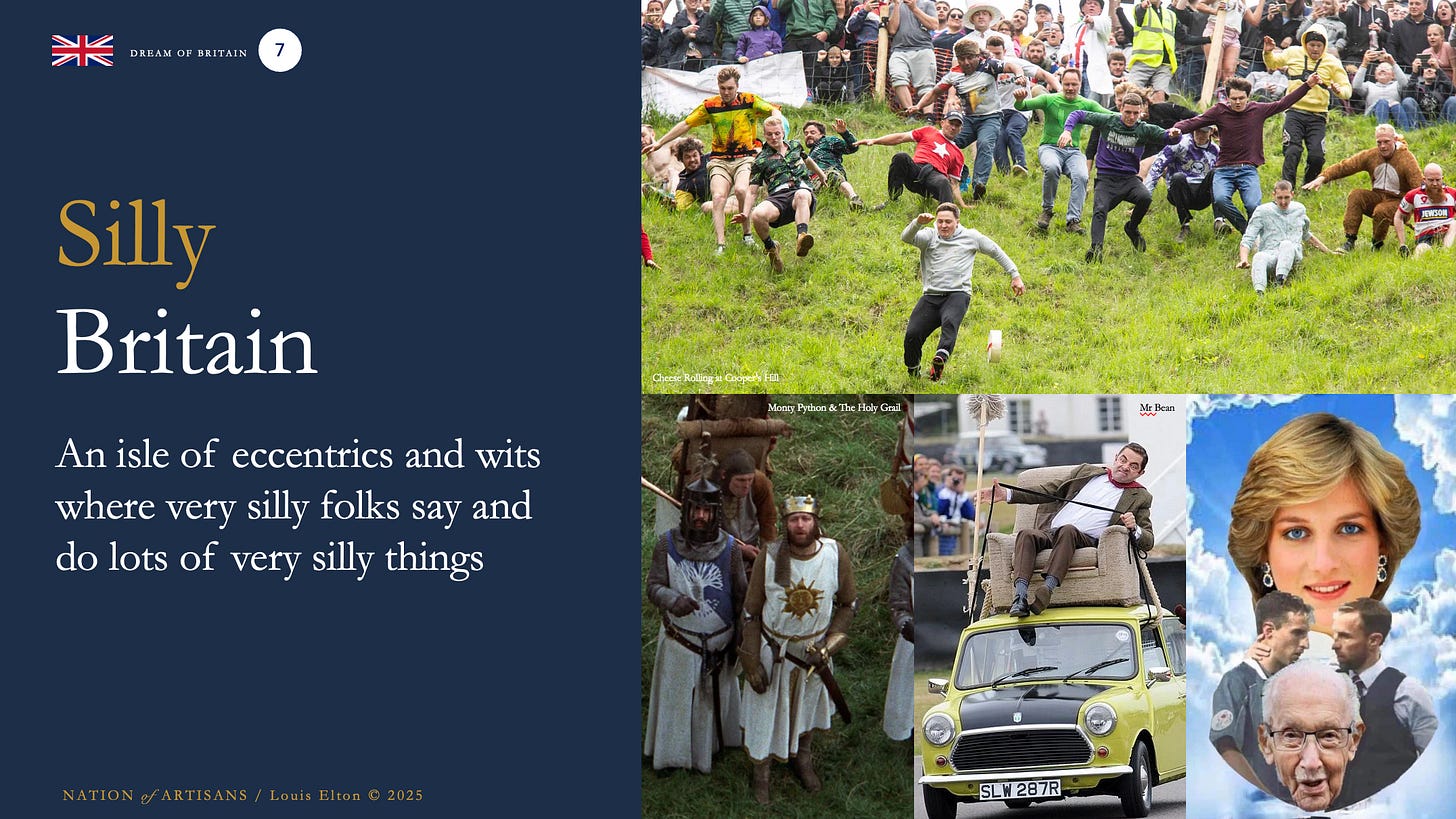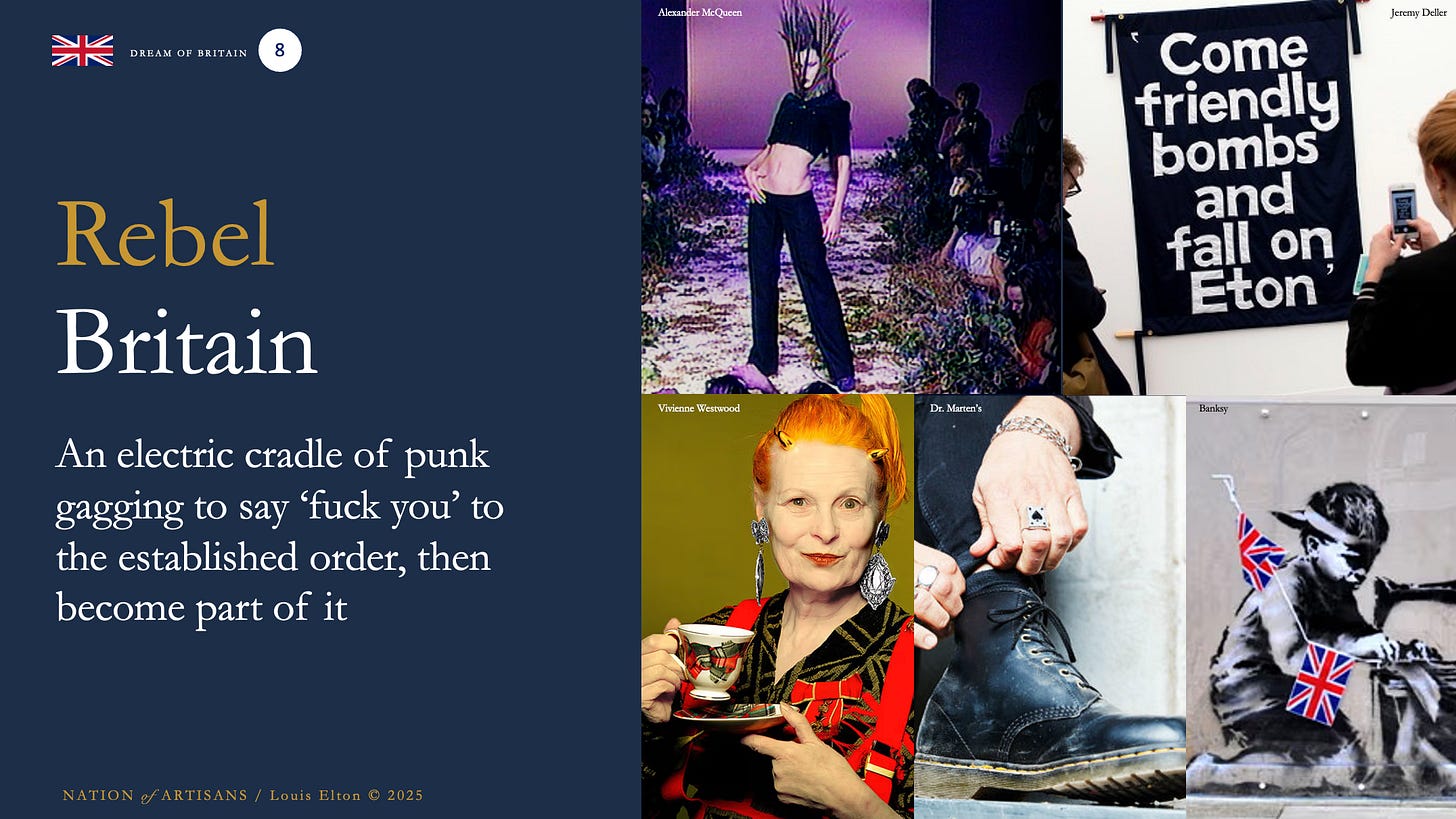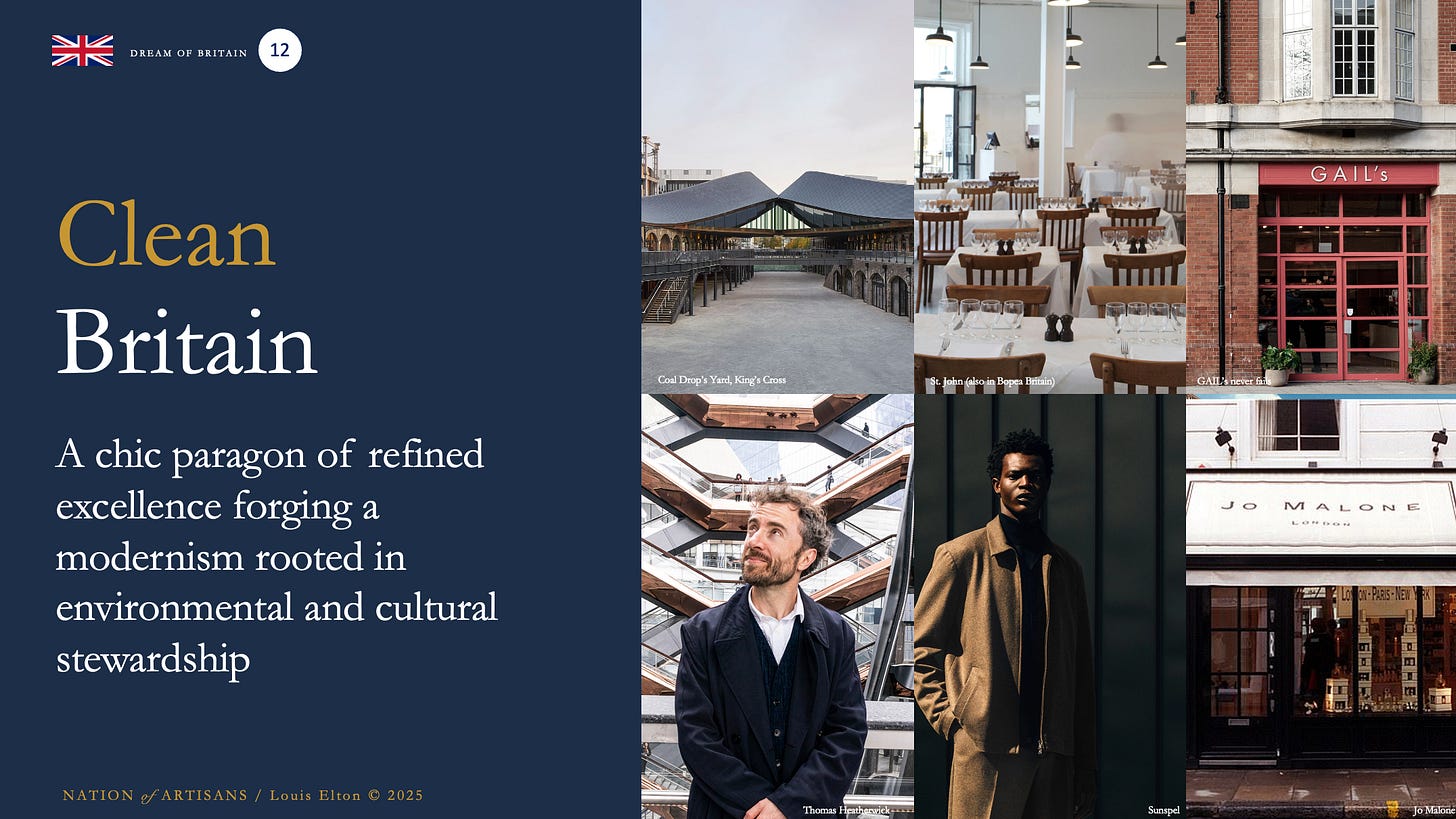In this week’s post, I dive into the tricky question of which “Nation” it is in the “Nation of Artisans”. The TL;DR is: (1) to start to re-imagine a new vision of Britishness, I have created a fun segmentation/listicle of 15 aspirational “Dreams of Britain”; (2) I want to meld some of these dreams to inspire the project’s brand and design language; (3) I tease a design competition to co-create the future of Nation of Artisans.
NOTE: The mood boards in this post are too heavy for email, so check it out online to see all 15 Dreams of Britain in their full glory.
Which “Nation” is it anyway?
I am aware that when I chose to name my project “Nation of Artisans,” I may have poked at some open wounds. The concept of a nation – for obvious reasons – has problematic connotations. The historically nationalist and violent manifestations of “nation” give critics just cause to be skeptical.
Things start to get messy when “nation” is defined in overly essentialist, objective and exclusionary terms, e.g. “Nation is language, ethnicity, ancestry, history”. “Fit in or fuck off” etc.
However, as historian Benedict Anderson writes in his seminal 1983 book Imagined Communities:
"In an anthropological spirit, then, I propose the following definition of the nation: it is an imagined political community — and imagined as both inherently limited and sovereign.”
By this, Anderson means:
A nation is an “imagined community” in the sense that “the smallest nation will never know most of their fellow-members.”
It is limited because all who live in it do not believe that all of humanity can be part of it.
It is sovereign because the concept emerged at a time when the divine ordination that previously gave legitimacy to kingdoms was becoming unsustainable in the emerging age of Enlightenment and religious pluralism.
It is a community because, despite glaring inequalities, the concept has been used to foster a sense of comradeship — often so powerful that many would die for it.
Now, the hidden truth of the nation of Britain is that if we “imagined” it, we could just as easily re-imagine it differently.
A commitment to capitalism and relativism alone is simply too morally shallow an ideology to bind us together and build a better future.
Yet, imagining this new story requires thinking about previous visions and dreams of Britain.
Thus, I present: Nation of Artisans’ 15 Dreams of Britain 2x2.
Organised across two axis: nostalgic vs. innovative and punk vs. aristocratic, this 2x2 contains all the seeds required to heal the nation’s spirit! It’s that simple.
Eventually, I want to use these codes to craft a design language for Nation of Artisans that captures some of the more uniting and exciting visions of Britain.
In what follows, I dive deeper into each of the 15 dreams. This is a truly vibes-based segmentation. I’m sure there are missing parts — please suggest more dreams I may be missing.
Let’s dive in.
1. Royal Britain
2. Maverick Britain
3. Workshop Britain
4. Just Britain
5. Literary Britain
6. City Britain
7. Silly Britain
8. Rebel Britain
9. New Britain
10. Twee Britain
11. Silicon Britain
12. Clean Britain
13. Bopea Britain

14. Retrofuture Britain
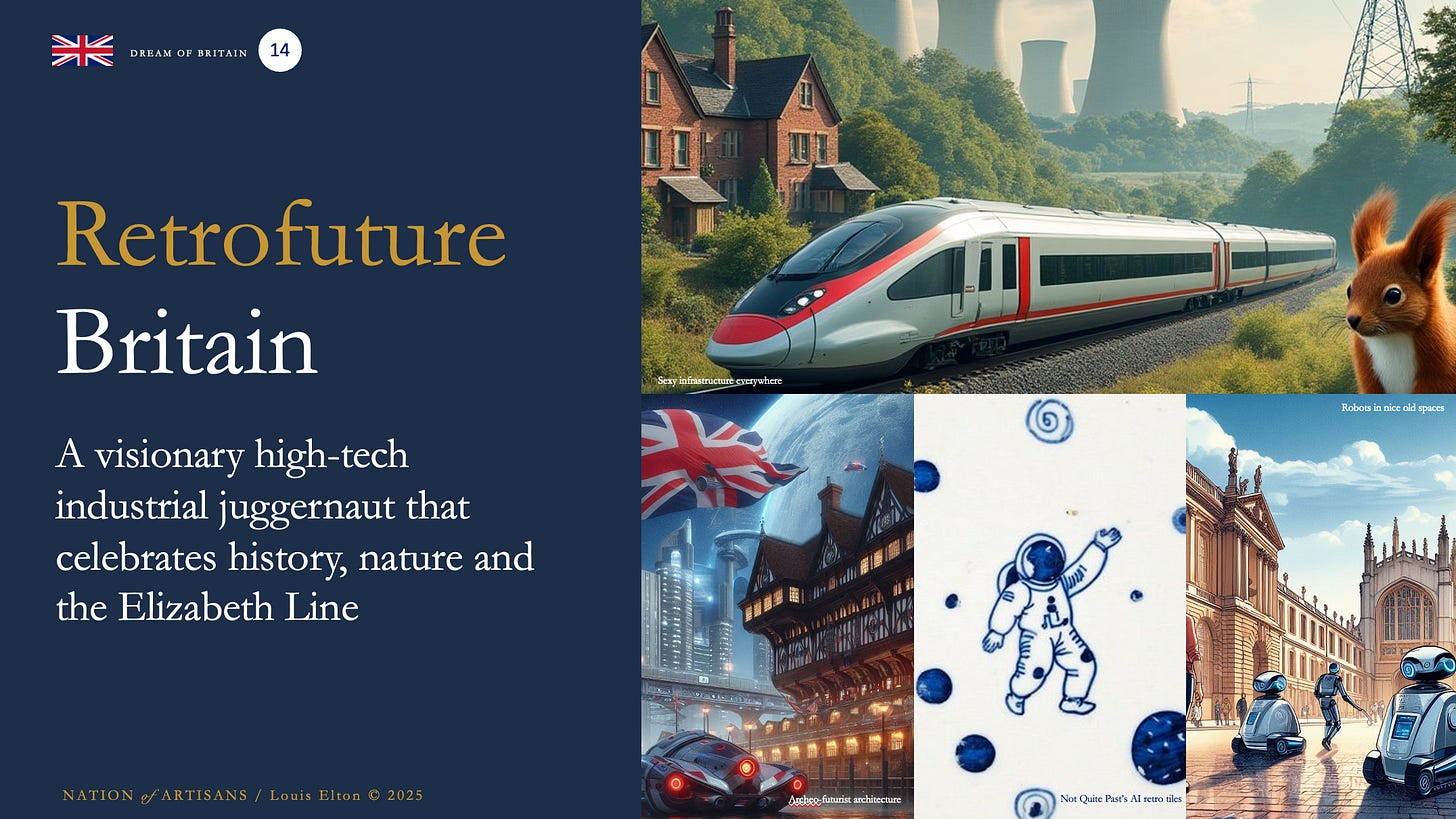
15. Moz Britain
Britain, Re-imagined
I do not know which dreams of Britain can heal the actual nation of Britain.
However, for Nation of Artisans, I plan to combine: the rooted spirit of Bopea Britain, the optimism of Retrofuture Britain, the creativity and soulfulness of New Britain and the majesty and oomph of Workshop and Royal Britain.
However, please make suggestions about what you think I should do.
Though artisanship and making could be clustered under Twee Britain, I find this dream fairly dreary and uninspiring. There is no room for Twee Britain in Nation of Artisans!
What’s Next?
In the coming days, I plan to open Nation of Artisans up to the public by launching a competition to design a logo.
Inspired by Burberry’s 1901 crowdsourcing of the Equestrian Knight Design, I am going to launch a prize to design the logo and visuals for Nation of Artisans.
The Garamond text-based logo I made on PowerPoint is not enough to heal the nation’s spirit. We need something potent and beautiful.
More to come.
Now Try This…
Since launching Nation of Artisans two weeks ago, I’ve been touched and astounded by the flood of support I have received on Instagram and Substack. Thank you so much. Please share the word.
On Saturday I ate at a delightful restaurant called Little Duck The Picklery — very Bopea, very Hackney, very delicious! As I gorged myself on its farm-to-fork, Modern British delights, it occurred to me that it is remarkable that while a culture war has engulfed the nation over the last decade — British chefs have managed to quietly re-define “Modern British” without getting trapped in any of the divisiveness. £25 per small plate sure does afford you a lot of creative freedom!
This week, in an attempt to understand some of the seemingly baffling thinking driving US politics at the moment, I read The Technological Republic by Palantir CEO Alex Karp and Nicholas Zamiska. It’s at times mad and reactionary, but also fascinating — particularly when they write about swarms of drones (terrifying!) and national identity in a pluralist, secular West. I was amazed to discover that Karp briefly studied under Jürgen Habermas in Berlin. It would be a shame for America and Europe to re-arm their militaries — but not their spirits!
Until next time.









